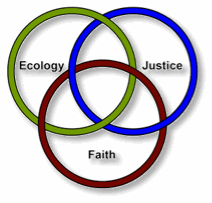Religious Leadership
Reforming Theological Education
To Meet the Environmental Challenge
The massive patterns of eco-injustice that misshape our near future are historically unique, demanding a response. This situation requires a reshaping of theological education to meet the environmental challenge. Such education should be redesigned to explore and foster experiences, beliefs and actions consistent with “a vision in which all forms of life have their place and receive respect and care.” Theological schools and religion departments can join in this “great work” (Thomas Berry’s term) by intentionally inspiring and equipping students to become more earth-friendly, justice-seeking, community-sustaining religious leaders.
Theological Education to Meet the Environmental Challenge (TEMEC) was a special project designed to foster real movement in that direction. Over a 12-year period, the Program on Ecology, Justice and Faith (PEJF), that I directed, and the Center for Respect of Life and Environment (CRLE), directed by Richard (Rick) Clugston, teamed up to foster theological education / religious studies focusing on eco-justice – i.e. the quest for ecological sustainability in linkage with socio-economic justice. (N.B. It’s a double “eco”.) Our activity through this deeply ecumenical project focusing on reform of theological and religious studies expressed the commitment of the eco-justice movement to serve earth community and its most vulnerable inhabitants of everykind.
Below is a summary of what we did and lessons we learned in this endeavor.
Read more (.pdf)
The Lord’s Prayer for Earth Community
A brief version of this sermon was first preached by DTH in March, 2001 while leading a Savannah (Georgia) Presbytery Conference on “Preaching the Stewardship of Creation.”
The text was expanded and revised for publication in David Rhoads, ed., Earth and Word (Continuum, 2007), a book of sermons on “saving the planet.” It was revised again for this posting. The crisis of ecological destruction and social injustice has local and global impact. This sermon proposes that the Lord’s Prayer illumines the path to a faithful response.
Read more (.pdf)
Syllabus for “Eco-Justice Now” Ethics Course
What is the shape of a robust Christian ethical response to the deepening environmental crisis? Key norms of ecological and social justice, fostered by the ecumenical movement, guide our assessment of this crisis and of constructive ways to respond. This course will discuss insightful writings of pioneering ethicists, review pertinent biblical themes and read scripture with a view from outdoors, revision our human vocation consistent with God’s purpose, unpack eco-justice values in their breadth and depth, explore five basic Earth citizen responsibilities, and wrestle with ethical dilemmas as posed in case studies. Together we can discern ways to resist destructive economic globalization, consumerism, and fatalism about climate change or species extinction, and to follow an eco-just path of caring for creation.
Read more (.pdf)
